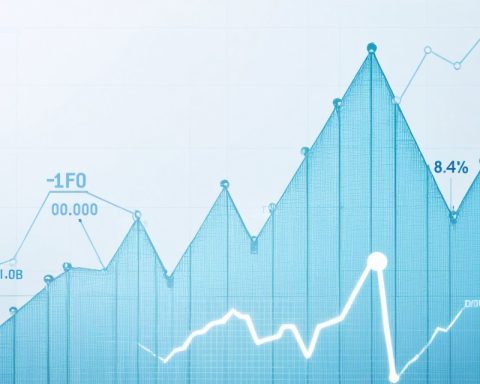- Vulcan Materials achieved $1.85 billion in sales during the fourth quarter, exceeding Wall Street expectations with a 1.1% year-on-year growth.
- The company reported a significant non-GAAP profit increase of 23.4%, reaching $2.17 per share, highlighting effective pricing strategies and solid operations.
- Vulcan’s EBITDA guidance for the upcoming year surpasses analyst predictions by $100 million, indicating expected further growth.
- Despite a slight decline in tons shipped, the company improved monetization efficiency, with revenue growth outpacing shipping volume declines.
- Vulcan maintains a robust free cash flow margin of 15%, showcasing resilience despite market pressures.
- Investing in Vulcan depends on confidence in its strategic management, adaptability to economic fluctuations, and continued innovation.
In a landscape where the ground continually shifts, Vulcan Materials stands firm. Its recent fourth-quarter results painted a promising picture for this venerable construction giant. Despite the cyclical challenges that often rock the construction sector, Vulcan’s sales reached $1.85 billion, edging past Wall Street’s expectations and marking a modest yet meaningful 1.1% year-on-year growth.
The true strength of Vulcan’s foundation, however, lies beneath the surface numbers. Its non-GAAP profit soared 23.4% beyond analysts’ forecasts, reaching $2.17 per share. This surge underscores a savvy pricing strategy intertwined with strong operational performance. What’s more, Vulcan’s EBITDA guidance for the upcoming year hints at further growth, predicting figures that outpace analyst predictions by a cool $100 million.
Yet, the company’s story is one of remaining agile amid broader economic swings. While tons shipped slipped slightly to 53.9 million, a deeper look reveals Vulcan’s rising monetization efficiency, with revenue outpacing shipment volume declines. This resilience echoes through its robust free cash flow margin, holding steady at 15%, even as market pressures cause others to falter.
Observers might wonder, is it time to invest in Vulcan? The answer hinges on one’s belief in the company’s capacity to capitalize on its steady management and innovative leaps forward. As it navigates the unpredictable paths of interest rates and raw material costs, Vulcan Materials appears determined to pave its way into the future with unwavering precision and foresight.
In a world of shifting sands, Vulcan Materials doesn’t just weather storms. It builds a path forward, brick by brick, with strategic vision and operational finesse, keeping its eye firmly on the horizon.
Is Vulcan Materials the Rock-Solid Investment Your Portfolio Needs?
How-To Steps & Life Hacks: Investing in Vulcan Materials
Investing in Vulcan Materials requires a simple, strategic approach:
1. Research: Understand the company’s financials, including revenue, profit margins, and growth forecasts. Platforms like Yahoo Finance or Bloomberg can provide up-to-date information.
2. Analyze Market Trends: Consider the current economic conditions influencing the construction industry, such as infrastructure spending and interest rates.
3. Assess Risk: Evaluate your risk tolerance and how an investment in a cyclical industry fits into your overall portfolio strategy.
4. Diversify: Ensure diversity in your investment portfolio to mitigate risks associated with economic downturns.
5. Buy in Stages: Consider dollar-cost averaging, where you purchase shares at regular intervals, averaging out your investment cost over time.
Real-World Use Cases
Vulcan Materials’ aggregates (crushed stone, sand, and gravel) play a critical role in various applications, such as:
– Highway and Infrastructure Projects: Integral to roads, highways, and commercial buildings.
– Residential Construction: Essential components for residential homes, driveways, and landscaping.
– Industrial Applications: Used in manufacturing and maintenance of utilities.
Market Forecasts & Industry Trends
The construction industry is projected to grow with a CAGR of around 4% from 2023 to 2030, driven by increasing public infrastructure spending globally. Vulcan, with its established market presence, is well-positioned to capitalize on this growth (source: Grand View Research).
Reviews & Comparisons
Competitors: Vulcan competes with companies like Martin Marietta and LafargeHolcim. Vulcan’s competitive edge lies in its strategic pricing and operational efficiencies.
Stock Performance: Over the past five years, Vulcan’s stock has shown resilience with steady growth, which can indicate a potentially safe long-term investment compared to more volatile sectors.
Controversies & Limitations
– Environmental Concerns: Quarry operations are often scrutinized for environmental impacts. Vulcan actively works on sustainable practices, yet faces regulatory challenges.
– Market Dependency: As a cyclic industry, Vulcan’s performance can be significantly affected by economic downturns which shrink construction activities.
Features, Specs & Pricing
– Revenue Growth: Recent reports indicate a 1.1% year-on-year growth.
– Profit Margin: Impressive 23.4% increase in non-GAAP profit, surpassing Wall Street forecasts.
Security & Sustainability
Vulcan Materials invests in eco-friendly practices, including land restoration post-quarrying and reducing carbon footprints. Security of supply and sustainable practices are central to their operational model.
Insights & Predictions
The expected increase in public infrastructure projects in the U.S. suggests a bright future for Vulcan. Additionally, the firm’s solid free cash flow and strategic management could ensure continued financial health.
Pros & Cons Overview
Pros:
– Strong market position with significant market share.
– Excellent cash flow and profit margins.
– Forward-looking management with strategic foresight.
Cons:
– Cyclicality of the construction sector.
– Environmental regulations pose continuous challenges.
– Potential inflationary pressures on raw materials.
Actionable Recommendations
1. Monitor Economic Indicators: Stay updated on infrastructure policies and economic indicators that affect the construction industry.
2. Stay Long-Term: Consider Vulcan for long-term portfolio diversification due to its foundational role in public and private infrastructure.
3. Review Annually: Regularly review your investment in the context of shifting economic conditions and Vulcan’s performance in the market.
For reliable industry insights, visit Bloomberg and Reuters.



















